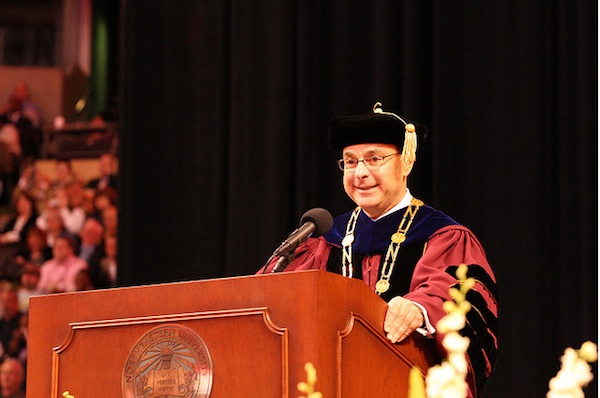Northeastern President Welcomes (and Fears) Online Education

Image Credit: SignalPAD via Flickr
Northeastern University president Joseph E. Aoun recently penned an op-ed piece in the Globe saying that, thanks to massive and free online college programs such as the Harvard and MIT brainchild edX, “We’re witnessing the end of higher education as we know it.”
Brick by brick, the walls are crumbling down. No one is safe. The Great Democratization is on. El Revolution! College will never be the same, and even the Old Guard — the gatekeepers, fat and rich university brass who have spent centuries protecting Knowledge and the inner sanctum of higher education from the unwashed swill of society — knows it. And you can smell the fear.
Aoun’s warning is hardly big news to those who’ve been paying attention. (Check out our September story on edX and the future of higher education) But it’s interesting to note that Aoun, while outwardly embracing the new frontier of online college education, clearly seems nervous. Without saying so overtly, he is actually on the defensive, battling against the oncoming changes in higher ed. He wants to calmly assure you that his university will not be hit as hard as others.
Universities will no longer be considered good simply because they are exclusive and let so few people in, he says, noting that the new massive online programs, like edX, allow anyone to participate regardless of qualifications or financials resources. And he says that colleges will lose considerable control over the educational process, stating that “the monopoly that colleges and universities have on advanced learning and degree granting will be dismantled.” But then he goes on about who will survive this educational day of technological reckoning, and this is where my ears perked up.
Aoun says that the traditional colleges able to survive will be those capable of proving that they’re worth paying to go to. And in this modern work-starved climate, if a school can deliver a job to a student, for example, or a certain salary range, Aoun says, it will have a chance of co-existing with the likes of edX, or similar endeavors such as Coursera or Udacity. This, of course, is funny to anyone who knows Northeastern University.
For ages, Northeastern has differentiated itself from the massive pile of competitive and super-competitive colleges by focusing on the practical versus the largely ethereal mantra of “knowledge for knowledge sake.” Northeastern’s once-unique Cooperative Education program has long thrust students into the workforce, having them alternate between traditional classes and real-world employment during the school year, giving students a leg up by providing practical experience and networking in their chosen field. Aoun is telling the world that the End of Days is coming and it’s coming fast, but Northeastern is already ahead of the curve and is gonna be just fine.
Over the coming months and years, it will be interesting to watch the varied ways that desperate university presidents try to stave off the panic sweeping across college administration buildings everywhere. It’s been a top-down monopoly for so long and now the Internet is threatening universities’ entire way of life and livelihood. In his closing comments, Aoun provides a signal to watch for as the power struggle continues. If universities embrace the edX model, which offers the exact same classes to non-paying students as paying students, then universities should be willing to offer the same degree. If however, schools offer a lesser degree to free online students and a “luxury brand” degree to full-paying students, then we will have a better read on just how scared Establishment types such as Aoun really are.


